|
 |

SAT NEWS - MEET THE PEOPLE

Dear Travel Partner,
for many visitors, traveling in South America is all about the people, their lives and traditions.
In this newsletter, we focus on community tourism and local encounters. Travelers are invited to experience authentic local culture with all of its diversity, traditions and beliefs, thereby supporting the locals and helping preserve their way of life. Joining people during their daily routine, walking through their village, cooking and doing crafts together or even spending days in their communities, is a unique experience for travelers.
We can only present you with a small selection of different experiences across South America, there is so many more to discover! All those elements can be easily implemented in any program including the must-see places of each country.
Looking for more inspirations? Just contact us, we are happy to help.
Enjoy reading and all the best
your SAT Team
Follow us on Facebook, Instagram and Youtube for more news, products and impressions!
 |
 |
|
 |
|
ECUADOR - BOOBIES AND BEER IN GALAPAGOS
|
 |
|
Galapagos is world famous as a unique nature paradise, where animals have never learned to fear humans. The islands are home to the most diverse plant and animal species in the world, with giant tortoises, iguanas, albatrosses, and the blue or red-footed boobies, just to name a few. But did you know that Galapagos is also about the local culture, not to mention their own local beer? Craft beer is popular in many places around the world these days, so why not have a brewery in the middle of this unique
archipelago, on Santa Cruz Island, base for many international travelers. The folks at
Santa Cruz brewery had this wonderful idea, and 10 years ago they brewed their first craft beer as homebrewers on Santa Cruz Island. They expanded over the years, and built a
microbrewery in the climatic transition zone of Santa Cruz Island. Since 2019, locals and tourists can visit the
craft beer production plant and the Beer Garden to learn about the production process in an experiential way, see the raw materials, and participate in the production process by grinding malt in the plant's bicycle mill. Highlight of the tour is of course the
beer tasting, where guests can rate the different beer styles, whether traditional or experimental, all 100% made in Galapagos. There is the Carapachuda (Porter with Galapagos coffee), the Colorada (Irish Red Ale) or the Gringa (American Pale Ale), and the latest creation is the Gose style beer, made with sea salt and organic coffee cherries, both products from Galapagos. This local venture aims to replace beers brought from the mainland, thus
minimizing the environmental impact. Their biggest goal is keep
inspiring for positive ideas in any fields, in their community; and keep showing all the love the "Galapagueña" people have to the place they live in.
|
|
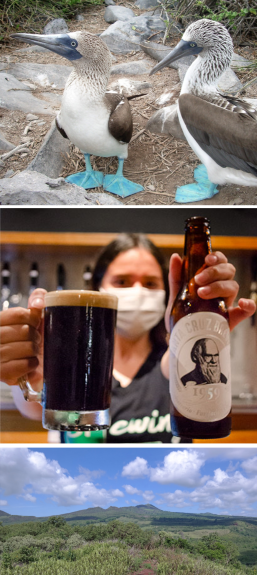 |
 |
|
 |
|
COLOMBIA - RHYTHM AND DRUMS IN THE MANGROVES
|
 |
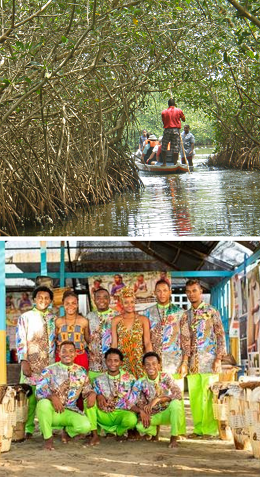 |
|
This tour is an exceptional combination of exploring the
natural wealth around
colonial Cartagena on the Caribbean coast and experiencing an
Afro-Colombian percussion
workshop in the middle of the mangrove forest. From the small fishing village of La Boquilla, guests cross the mangrove forest and the Ciénaga de Juan Polo lagoon by traditional canoes, passing through incredible
natural tunnels created by the
mangrove forest. Some have names like Tunnel of Friendship, Tunnel of Love and Tunnel of Luck. Guests enjoy crossing the waters of this swamp, seeing fishermen at work, and observing closely the
local wildlife with birds, fish, reptiles, and amphibians. Each visitor can then leave their footprint by
planting their mangrove within the forest. After a visit of the “cabildo” school, a safe space for 105 children, guests are invited by
BATAMBORA for a drum workshop. Batambora is a project led by young entrepreneurs from the
Afro-descendant local community, committed to human and economic development, to rescue and
preserve the traditions of African heritage. A wonderful opportunity to support this initiative, and to connect with typical Afro-Colombian rhythms of the
region's folk music, like
cumbia, mapalé or
champeta. The musicians finally invite guests
to play the drums, and learn about their African heritage: play even if you don't play, dance even if you don't dance, sing even if you don't sing, together we can! The workshop closes with a contagious
drum show with recycled resistance drums. Click here for more information! |
 |
|
 |
|
URUGUAY - NATIVE FRUITS & MEDICAL PLANTS
|
 |
|
Meet the women of
Hierbas y Nativos Severino, who are using their love of plants to make a difference, promoting the
cultivation and consumption of native fruit and medicinal plants. The collective of women, one of them an agricultural engineer, started 12 years ago and has taken it upon themselves to cultivate plantations of native grass and tree species in 25 de Mayo and its surroundings. Among the
medicinal plants that are harvested, dried and packaged before being sold to a Montevideo-based herbalist, are yarrow, Cow’s Foot, Mburucuyá (passionfruit species) and Cola de Lagarto (tropical fern species). During a 1.5h-
visit of the work space, you first receive an
introduction into the collective’s work. You learn about the difference between aromatic and medicinal herbs, how to identify different species, about harvest times and planting methods. The collective also explains the importance of sustainable farming, including non-herbicide treatments of the land, natural prevention of insects, fresh water reserves for irrigation and organic fertilizer. After that, it is time to go outside and test your new plant-identifying knowledge! Depending on the time of year, you can also help with planting or transplanting seedlings. Finally, you learn
how to properly package and store the precious herbs, accessing the dryer to help prepare the herbs for further processing. Your visit ends with a
tasting of the collective’s products.
For more information about this excursion or other local encounters in Uruguay, please contact us! |
|
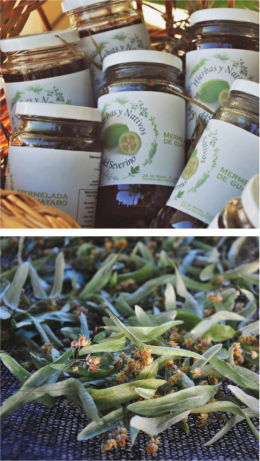 |
 |
|
 |
|
BRAZIL - COLONIAL PARATY & CAICARA CULTURE
|
 |

|
 |
|
 |
|
Halfway between the world famous cities of Rio de Janeiro and Sao Paulo on the
“Green Coast” (Costa Verde), you find the precious colonial town of
Paraty, UNESCO World Heritage Site since 2019. Once a thriving gold port between the 17th and 19th century, the colorful town is now a unique place to visit, with well-preserved whitewashed houses with brightly-painted doors and shutters, backed by the lush Atlantic forest and surrounded by a gorgeous emerald-green sea. The bay of Paraty counts more than 100 stunning beaches, and over 50 islands.
Araújo Island, the second largest island, is home to a vibrant local
Caiçara culture. Caiçaras are the traditional inhabitants of Brazil’s southern coastal regions, mainly indigenous people and descendants of African slaves. We take the guests by boat to the island to experience a special
Caiçara tour, visiting the
local fishing village, discovering their cultures, customs and lifestyle habits. Guests will be
guided by a local fisherman, walk around the island, visit the local church, school and library, as well as artisans. There will be time to enjoy the beach and taste a
traditional lunch before returning to the mainland.
Another interesting experience in this area is a visit of a local
Quilombo Community. Quilombo describes a settlement formed by former slaves, preserving their
African culture and habits. A visit usually starts with the storytelling with one of the
elders of the community, called
griot (owner of knowledge), about all the history of resistance and community struggle. After the conversation with the
griot, guests take a walk through the community to get an idea of the
daily life of the families, and visit the handicraft house. Lots of activities like performances of
jongo or capoeira angola rhythms can be added, as well as
basket weaving and
planting saplings. Click here to get more info. |
 |
|
 |
|
PERU - VISIT THE ACHOMA COMMUNITY
|
 |
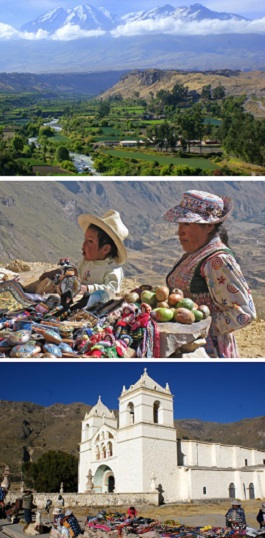 |
|
In Peru, local encounters are the rule, not the exception. Great possibilities to mingle with locals exist in several places, the most well-known communities allowing visits are found around Lake Titicaca, or in the Sacred Valley. The
Colca Canyon, located between Arequipa and Puno and
one of the deepest canyons in the world, is a beautiful place to visit. Calm, with impressive landscapes and a famous lookout featuring condors soaring above your head almost every day, it is a must-see in any trip to Peru. The visit to the
local community in Achoma makes this stop even more special. Achoma, located between the Condor Cross Lookout and Chivay, the main town of the canyon, is a picturesque little village. Its streets, main square, and colonial church have been declared
"historical monuments" back in 1980. Locals here live almost exclusively from agricultural activities, cultivating mostly potatoes, beans, and peas. With this visit, you get to fully immerse yourself in the culture, starting with
dressing as one of the locals. As almost everywhere in the Peruvian Andes, the local dresses have distinct features unique to each village. Locals can tell from the form of the hat or the embroidery on a dress which particular village a person is from. After an ancient ritual to give thanks to Pachamama (Mother Earth), you get
to work on the fields, learning about plowing and sowing techniques. During an
outdoor lunch, you can take in the views of the Colca Canyon
, while
enjoying a meal with the local family, sharing stories with them, and maybe learning some words in Quechua, the local language and the second official language in Peru. Further experiences include a
cooking class for Quinoa Soup,
fishing, and local dances.
Contact us for more information. |
 |
|
 |
|
ARGENTINA - ARGENTINE PIONEERS
|
 |
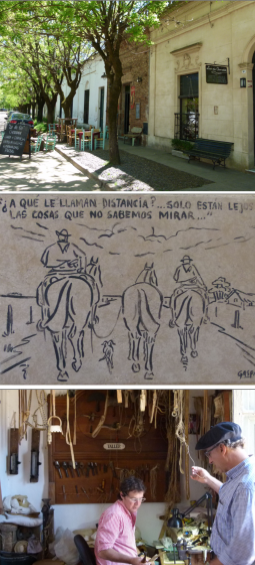 |
|
The bustling metropolis of Buenos Aires is surrounded by vast grasslands. Less than an hour's drive from the city, you find yourself in the middle of the
pampas, with endless pastures and open skies. This area is not only the center of the country’s livestock industry, it also gives a glimpse into the history of Argentina, as the
Gaucho culture was born here. The small town of
San Antonio de Areco is the heart of the gaucho culture in the pampas region, surrounded by beautiful traditional
estancias, the cattle farms. Also known as the
Cradle of Tradition, the colonial town, founded over 280 years ago, is filled with old bars,
pulperías, and artisan shops with more than 30
silversmiths. We take the guests on a walk around the
small village’s cobblestoned streets and its quaint
historical center, to meet some of the locals along the way. We make a stop for a
mate tea or coffee, as they learn more about the area’s history and the local life. We visit the
Draghi’s silversmith museum, and meet with an
artisan who will tell the family’s fascinating story. Known as
platería criolla, the traditional
Argentinean silverworks include knives, jewelry, and other traditional items. We then meet with a
painter and visit his
140-year-old studio that also exhibits traditional painting. Guests enjoy a break at a
pulpería, the meeting place for gauchos
, to have lunch in the old restaurant atmosphere. The local
Gaucho Museum and the
handmade chocolate factory are not to be missed. Guests can also visit a local social project, where disabled people make handmade
Alpargatas (typical gaucho shoes). The small factory is the only one offering disabled people job opportunities; they work, earn their own money, and socialize with others through sports and theatre. By purchasing local goods or with donations, guests support the project and workers directly. SAT has been supporting this project since 2018. Contact us for more info. |
 |
|
 |
 |

|
 |
|
 |
Embark on an exploration of
Kurarewe, a community located in
Chile’s Araucanía region. It received its name from the mountain range towering over the area, which is called “stone altar” in Mapudungun, the language of the
indigenous Mapuche. During your visit, you have the opportunity to meet Mapuche families, join their daily activities and gain insight into their rich culture, expressed in local cuisine, crafts and traditional weaving. All the while, you bask in the beauty of the
lush
nature of the Araucarias Biosphere Reserve around you. There are different programs available, depending on your interests. One is based on rural living, including a
visit to an orchard, local farms and a workshop that produces natural cosmetic from honey and herbs. If you are interested in the Mapuche’s ancestral knowledge, you can join a
traditional cooking workshop followed by a visit to a medicinal herb garden and a hike on an interpretative forest trail. To dive deeper into Mapuche culture, you can opt to
spend the night in one of the communities. This experience starts with an introduction into the general aspects of the Mapuche’s traditions and beliefs. Afterwards, you visit a local craftsman to learn about traditional wood working and join on of the younger members of the community in ancient games that have endured until today. The next day, you head out into the Araucaria forest to learn more about local flora before getting to know some of the musical instruments of the Mapuche and trying your hand at playing them. Your stay ends with a visit of a handmade soap workshop.
Curious for more? Please contact our team for additional information. |
 |
|
 |

|
 |
|
 |
South American Tours - Global Sales Office
South American Tours GmbH | Kaiserstr. 23 | 60311 Frankfurt am Main | Germany
Phone: +49 (0) 69 4058970 | Fax: +49 (0) 69 40589799
Mail: sales@southamericantours.com | www.southamericantours.com
South American Tours - Sales Office North America
Mail: sales-america@southamericantours.com
South American Tours - Sales Office Italy
Mail: sales.italy@southamericantours.com
Copyright © South American Tours 2012-2022
Imprint
South American Tours de Uruguay Agencia de Viajes S.A. | Buenos Aires 618, Piso 2, Oficina 201 | 11000 Montevideo | Uruguay
Tel.: +59 82 91 60 050 | Fax.: +59 82 91 55 406 | E-mail: info@southamericantours.com
Managing Director: Federico Büker | Registered Office: Montevideo | Local Court: Montevideo | Commercial Register: 1194 (Ministry of Tourism) | VAT identification no.: 215224020014

|
 |
|
Protection of data privacy and cancellation of the subscription:
This message has been sent to jzenner@southamericantours.com. If you do not want to receive mails in the future you can unsubscribe by clicking
here.
|
|
|
 |
|
 |
 |
|
|